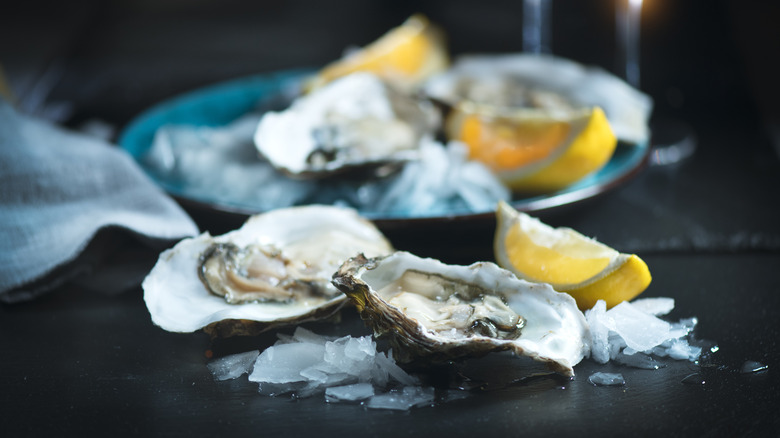According To Greek Mythology, This Is What Aphrodite Would Eat
If you are looking to elevate your everyday diet, you can't get much better than eating like a goddess, can you? The stuff of epic myths and romantic tales is certainly the stuff of a more exciting, fulfilling food routine. There's one goddess, in particular, with her own category of food. From seafood to fruit, these items are all famous for stirring up amorous intentions.
In case you are not familiar, "aphrodisiacs" refer to any substance or food that stimulates sexual desire, according to Verywell Mind. This goes beyond the whole idea that the way to someone's heart is through their stomach. Sure, cooking any meal for your crush or partner is a romantic gesture and makes for a special evening. Aphrodisiacs, however, are specific foods with effects like raising the body temperature or engaging certain senses, all attributed to increased pleasure.
These date-worthy eats are named for the goddess Aphrodite, many of them storied to be her favorite foods. Aphrodite is the Greek goddess of love and beauty, explains Greek Mythology. She is said to have been born of seafoam, and the ancient Greek word "aphros" actually means seafoam. So, Aphrodite's own origins led to the origins of aphrodisiacs, something we still know and discuss (and certainly eat) today.
For a little romance, consider Aphrodite's favorite foods
According to Uncle Gussy's, Aphrodite snacked on oysters, dark chocolate, honey, figs, and asparagus. These are all natural, and — give or take the asparagus — lush foods that aren't a mystery in terms of their aphrodisiac classification. Spicy foods are also considered aphrodisiacs because they raise one's body temperature, per Verywell Mind, and other aphrodisiacs include pomegranates, pine nuts, almonds, walnuts, maca, pumpkin, watermelon, celery, bananas, garlic, salmon, saffron, coffee, avocado, and strawberries. Where the list of foods considered aphrodisiacs overlaps with foods available in ancient Greece, there we have contenders for the goddess Aphrodite's go-to meals.
Oysters have the strongest link to Aphrodite because, after being born in the sea, Aphrodite was brought to land by a scallop or oyster shell (per Getty). She is often depicted rising out of a seashell.
All the lore around Aphrodite and aphrodisiacs contributes to what Verywell Mind writes is probably the strongest explanation for this food group's romantic results: the placebo effect. Sure, many of the foods under this umbrella possess things like zinc, potassium, and phytochemicals that contribute to a boost in overall well-being, which could certainly in turn improve desire. Even more powerful, though, could be the history behind an aphrodisiac and the belief that it will have a positive impact on one's love life. So, knowing what the goddess of love and beauty preferred to dine on can go a long way in the aphrodisiac abilities of your next oyster, fig, or asparagus side dish.

